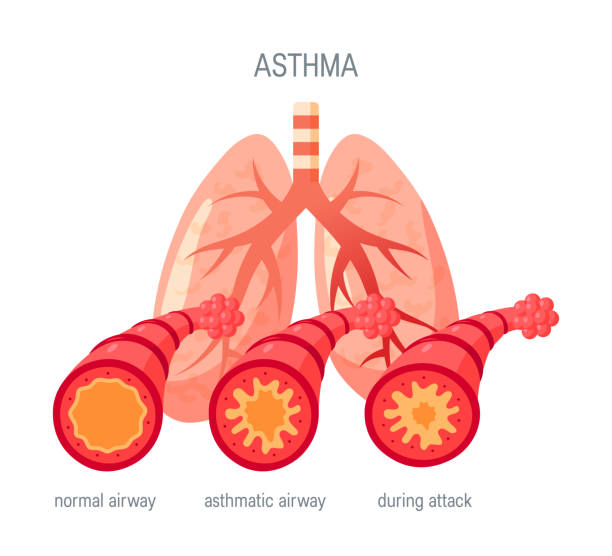Asthma is a chronic respiratory disease that affects millions of people around the world. It causes inflammation and narrowing of the airways, making it difficult to breathe. In this article, we will explore the symptoms, causes, and management of asthma.

Symptoms of Asthma
Asthma symptoms can range from mild to severe and can occur intermittently or persist over time. The most common symptoms of asthma include:
-
Wheezing: A high-pitched whistling sound when breathing, especially during exhalation
-
Chest tightness: A feeling of tightness or pressure in the chest
-
Shortness of breath: Difficulty breathing or rapid breathing
-
Coughing: A persistent cough, especially at night or during physical activity
-
Rapid breathing: Breathing faster than normal, especially during physical activity
Causes of Asthma

The exact cause of asthma is unknown, but it is thought to be a combination of genetic and environmental factors. Some common triggers of asthma symptoms include:
-
Allergens: Dust mites, pet dander, pollen, mold, and cockroaches
-
Respiratory infections: Cold, flu, and sinus infections
-
Physical activity: Exercise-induced bronchoconstriction (EIB)
-
Irritants: Smoke, air pollution, strong odors, and chemicals
-
Weather changes: Cold air, strong winds, and changes in temperature or humidity
-
Stress: Emotional stress can trigger asthma symptoms in some people
Management of Asthma
Asthma is a chronic condition that requires ongoing management and treatment. The following are some effective strategies for managing asthma:
-
Avoid triggers: Identifying and avoiding triggers is a key component of asthma management. This may involve reducing exposure to allergens, avoiding physical activity during extreme weather conditions, or quitting smoking.
-
Medications: There are a variety of medications available for managing asthma, including bronchodilators, anti-inflammatory drugs, and leukotriene modifiers.
-
Inhalers: Inhalers deliver medication directly to the airways, providing quick and effective relief of asthma symptoms.
-
Asthma action plan: An asthma action plan is a personalized plan that outlines the steps to take in case of an asthma attack. It includes information on triggers, medications, and emergency steps to take.
-
Pulmonary rehabilitation: Pulmonary rehabilitation is a program of exercise and breathing techniques that can improve breathing, reduce symptoms, and increase physical activity.
-
Lifestyle changes: Lifestyle changes, such as regular exercise, a healthy diet, and stress management, can help improve overall health and reduce the risk of asthma attacks.
Home Remedies for Asthma: Natural Ways to Manage Symptoms
Asthma is a chronic condition that affects the airways, making it difficult to breathe. While there is no cure for asthma, there are a number of home remedies that can help manage symptoms and improve breathing. In this article, we will explore some of the most effective home remedies for asthma.
-
Breathing exercises: Practicing breathing exercises can help strengthen the muscles used for breathing, making it easier to manage asthma symptoms. Examples of breathing exercises include deep breathing, pursed lip breathing, and yoga.
-
Humidifiers: Dry air can irritate the airways and trigger asthma symptoms. Using a humidifier can help add moisture to the air, making it easier to breathe.
-
Salt therapy: Salt therapy, also known as halotherapy, involves breathing in salt-enriched air to help clear the airways and reduce inflammation.
-
Herbal remedies: Certain herbs, such as ginger, turmeric, and garlic, have anti-inflammatory properties that may help manage asthma symptoms.
-
Essential oils: Essential oils, such as eucalyptus and peppermint, have been used to help manage asthma symptoms. These oils can be inhaled using a diffuser or added to a warm bath.
-
Healthy diet: A diet rich in fruits, vegetables, whole grains, and lean protein can help improve overall health and reduce inflammation, which can trigger asthma symptoms.
-
Exercise: Regular exercise can help strengthen the lungs and improve breathing. However, it is important to speak with a doctor before starting an exercise program, as physical activity can sometimes trigger asthma symptoms.
-
Reduce stress: Stress can trigger asthma symptoms, so it is important to find ways to manage stress, such as through exercise, meditation, or counseling.
It is important to note that while these home remedies may help manage asthma symptoms, they should not be used as a substitute for prescription medications and treatment plans recommended by a doctor. If symptoms persist or worsen, it is important to seek medical attention.
Conclusion
Asthma is a chronic respiratory disease that requires ongoing management and treatment. By identifying and avoiding triggers, taking medications as prescribed, and following an asthma action plan, individuals with asthma can manage their symptoms and improve their overall health. If you suspect that you have asthma, it is important to seek medical attention promptly for proper diagnosis and treatment.












